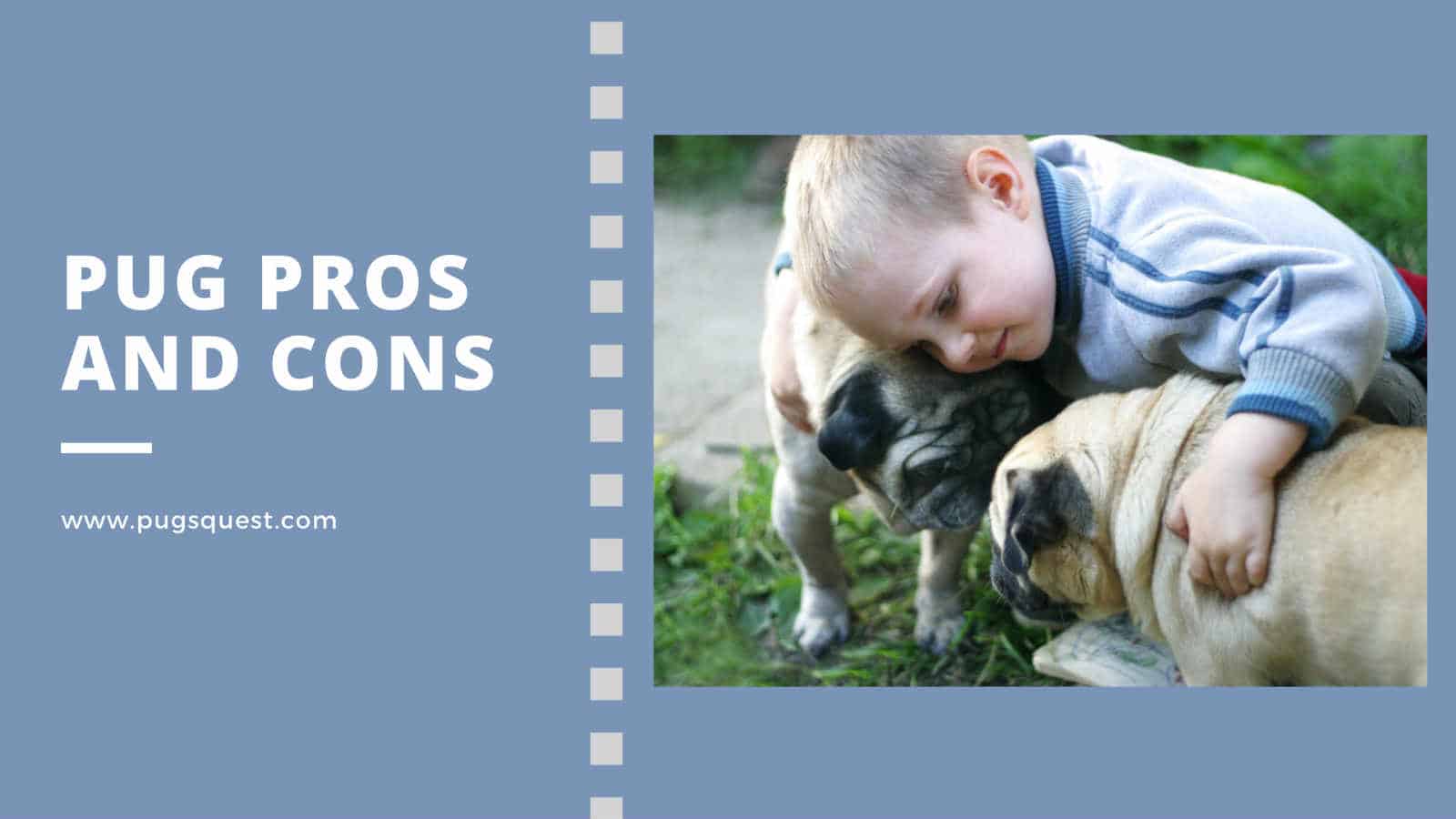
Knowing whether you are a suitable Pug owner is a difficult and important decision. It’s important to weigh up some Pug pros and cons before committing to a new pet.
But don’t worry. Here you’ll find everything you need to know about owning Pugs – good and bad – before making a final decision.
You’re well on your way to having a furry companion very soon.
What Are The Pros and Cons of Owning a Pug? Learn About The Pug Breed First
1. History
Pugs are an ancient breed that can be traced back over 2000 years to the Chinese Han dynasty as early as 206 B.C.
These first Pugs were the chosen companions of Emperors and elites and bred as refined animals to live alongside them in luxurious living quarters.
Since then the Pug continued to grow in popularity after reaching Europe in the 1500s. Today, Pugs are one of the most popular dog breeds known for their cute appearance and amiable personalities.
2. Key physical features
Pugs are best known for their scrunched up, winkled, fist-like faces. It is thought that the word Pug actually comes from the Latin “Pugnus” meaning “fist”.
Pugs are a toy breed, approximately 10-13 inches high and with a characteristically broad, square stature. Pugs weigh approximately 14-18 pounds and a healthy Pug can enjoy a long life of up to 15 years.
These tiny pooches come in three colours: black, fawn, and apricot (sometimes called silver), alongside some slight variations.
They are perhaps best known for their large round eyes and curious expressions that promise endless entertainment for any Pug owner.
3. Characteristic traits
Pugs are known for their flamboyant personalities, loyalty, humor, and endless capacity for love and devotion. These sensitive animals are happiest curled up on the sofa with their master.
The Pug has developed a reputation as the ideal house dog, great for families or as companions for the elderly.
But that doesn’t stop them from being a little bit stubborn from time to time. Pugs have a hidden diva inside and a voracious appetite that must be balanced out with regular, gentle physical activity.
Before Deciding To Get a Pug
Many people dream of getting a Pug. But before making this important decision it’s important to do your research and make sure that the breed suits your lifestyle.
Pugs may be thought of as a small, low-maintenance, inexpensive pet, but despite their unassuming demeanour, Pug’s require regular care to keep them healthy and happy.
Before deciding to get a Pug we advise that you consider these 3 essential criteria:
1. Finances
Ask yourself. Am I financially ready to own a Pug? Getting a dog incurs more than the upfront cost.
Pugs may be small but they require a high-quality diet and regular veterinary visits.
In fact, because of their propensity to develop certain health conditions, it’s wise to take out pet insurance on your Pug.
This will incur regular monthly payments but could save you the shock of sky-high veterinary bills when the unexpected happens.
There’s no shame in admitting you’re not ready to own a dog. This is the responsible thing to do.
Make Pug ownership a long-term goal and commit once you have the means to care for your dog.
In the meantime, you might consider volunteering at a Pug rescue to get a regular doggy fix and contribute to the breed’s welfare.
2. Time
Pugs crave closeness and need a lot of attention. When left alone for long periods of time, Pugs are known to develop separation anxiety.
If you’re out of the house most of the day, a Pug might not be the best pet for you.
If you are required to be out of the house for hours at a time, make sure your Pug has plenty of toys for mental stimulation (treat-dispensing toys are a great option).
Alternatively, you could mobilize friends, family, or a doggy sitter to keep your pooch company whilst you’re absent.
3. Care
Small in size doesn’t mean low maintenance. Pugs require a lot of TLC.
Owners should groom their Pug regularly. Pugs are prone to skin conditions so it’s important to wash their skin folds and brush their teeth to prevent infection.
Pugs also need to be kept out of extreme temperatures. They will need regular, but gentle, exercise and a diet of high-quality food.
Check out this video all about Pug food, hygiene and more!
Owning a Pug: The Pros
Owning a Pug can be a joyous experience. If you’re after a sweet, compassionate companion there’s nothing better.
We’ve compiled a list of some of our favorite Pug characteristics.
1. Small stature
Pugs are small and compact making them easy to carry, transport and take out and about. They’re called lapdogs for a reason. Small in size, they make the perfect sofa companion.
2. Quiet
Pugs are not loud or yappy dogs. In fact, they bark very little making them great for apartment living. Just be prepared for some regular low-level snoring from time to time.
3. Family friendly
Pugs are gentle, tolerant dogs making them one of the best breeds for children and other pets. Pugs are great company for children with whom they often become loyal friends.
4. Moderate exercise
Pugs require regular, but moderate, exercise. A gentle, daily walk alongside occasional playtime is sufficient. We advise two 20 minute walks twice a day to prevent overexertion.
5. Funny and playful
Pugs have an adorable, playful character that provides endless family entertainment. Pugs sleep hard but play hard too. Big fans of toys, games, and socializing with their family.
6. Friendly and loving
Pugs live up to their lapdog reputations. They love nothing more than staying by their master’s side and get along with most people – even other animals!
7. Apartment friendly
One of the best things about Pugs is how apartment-friendly they are. Pugs do not need much space to be happy and are less prone to chew than other dogs.
8. Loyalty first
Pugs are notoriously loyal, making them excellent guard dogs and perfect indoor pets for the elderly, city-dwellers, and first-time dog owners.
Owning A Pug: The Cons
For all their wonderful qualities, Pugs are not perfect. It’s important to consider the difficulties that come with Pug ownership before committing to the decision.
Take a look at this list of Pug ownership cons to see if a Pug is right for you.
1. Breathing problems
Pugs are genetically predisposed to develop breathing problems due to their elongated soft palettes and compacted snout. They often suffer breathing problems and snoring as a result.
2. Overheating
Due to their small noses, Pugs have very poor internal temperature control. They find it difficult to cool off in hot weather and will need a winter coat in the colder months.
It’s extremely important not to exercise your Pug in extreme temperatures.
3. Delicate eyes
The Pugs’ big eyes are one of their most endearing features but they are extremely sensitive to scratching, corneal ulcers and ocular proptosis which can occur if squeezed too hard.
4. Shedding
Pugs have a short-haired coat but are shedding as they’ll never stop. You’ll need to have a vacuum and lint roller at the ready if you want to maintain a hair-free home.
5. Cleaning
Pugs require regular care. You’ll want to wipe down those wrinkles regularly to prevent infection, and bathe your pooch with doggy shampoos about once a week to prevent acne.
6. Obesity
Pugs gain weight very quickly. Due to their reduced tolerance to exercise and never-ending stomachs, it’s very easy for a Pug to pile on the pounds.
You’ll need to keep their diet healthy and treats to a minimum.
7. Separation anxiety
Pugs can become anxious and depressed if separated from their owners for too long. This makes them wonderfully loyal, but if you’re away from home a lot another breed might be better for you.
8. Not outdoorsy
Pugs are not well suited to outdoorsy sorts. If you want a dog to accompany you on long hikes we recommend choosing a larger breed.
Pugs do not have a constitution for extremes of temperature or long periods of high-energy physical activity.
9. Vet bills
Because Pugs are prone to numerous health issues, Pug owners need to be prepared for sizable vet bills.
Pugs are prone to skin infections, allergies, and as a brachycephalic breed, they are genetically predisposed to blocked windpipes that may require surgery.
Is Owning A Pug Right For You?
Deciding whether Pug ownership is right for you will depend on your own unique lifestyle requirements. Pugs’ pros and cons are subjective. A Pug’s good and bad points are different for everyone.
For some, a docile, dependent, stay-home pup sounds ideal.
For others, this could spell disaster.
We advise doing your research. Ask yourself if you can meet this dog’s needs and if this dog can meet yours. Once you’ve found a match, you’ll have a companion for life.
